#mario puzo the family
Text


"Juan Borgia was almost as tall as Cesare, but slighter of build. Like his brother and father, he was an attractive man but with a difference. He had the slightly slanted eyes and high cheekbones of his Spanish ancestors. His skin was bronzed from his long hours of riding and hunting but there was often a look of suspicion in his widely set dark eyes."
— Mario Puzo, The Family.
#his description in this book goes hard#because a lot of authors got some sort of a one sided beef with juan *rolls eyes*#and here he's like 'oh wow what a spanish beauty that juan borgia lad is!!' *chief's kiss*#anyway i love how neil jordan took so many ideas from this book#mario puzo#the family#bookedit#litedit#litloversnetwork#booksociety#litdaily#novelsnet#periodedits#perioddramaedit#juan borgia#david oakes#the borgias#mario puzo the family#tvandfilmgifs#by jen
163 notes
·
View notes
Text
Then the Don put his hand on Hagen's cheek, embraced him quickly, and said, in Italian, "You've been a good son. You comfort me."
The Godfather, by Mario Puzo
#page 273#the godfather#godfather#mario puzo#don corleone#corleone family#vito corleone#tom hagen#italian american#mafia#mob#quote#quotes#literature#book#booklr#reading#family#this broke my heart more than sonny's death did i think#i love Tom so much
43 notes
·
View notes
Text
have any other the borgias enjoyers read the family by mario puzo ? If so I would be so so curious abt what u thought abt it !! <3
10 notes
·
View notes
Text
Friday Movies - God Father
The Godfather: A Cinematic Masterpiece that Stands the Test of Time
The Godfather is undeniably a cinematic masterpiece that has stood the test of time. Its impact on the film industry is immeasurable, and its influence can still be felt today. From its compelling storytelling to its unforgettable performances, The Godfather has secured its place as one of the greatest films ever made. The…

View On WordPress
#" Marlon Brando#"The Godfather#Al Pacino#Al Pacino&039;s Performance#American Cinema#Cinematic Excellence#Cinematic Masterpiece#Classic Films#Crime Drama#Family Dynamics#Francis Ford Coppola#Iconic Characters#Legacy of The Godfather#Mafia Movies#Mario Puzo#Michael Corleone#Organized Crime#Oscar-Winning#Vito Corleone
2 notes
·
View notes
Photo

#the godfather#francis ford coppola#mario puzo#al pacino#michael corleone#corleone family#revenge#all alone#thoughts#thinking#crime#drama#corrupt politicians#mafia#le clan des siciliens#suicide#anti hero#sicillian mafia#italian america#criminal#killing#murder#casino business#gang war#melancholy#assassination#organized crime#1960's#movi#best movies
11 notes
·
View notes
Text
I am sensing some massive insecurities in Cesare Borgia....
3 notes
·
View notes
Text
Behind every great fortune there is a crime.
—Balzac
#Balzac#honoré de balzac#comedy#crime#the rich#1%#quoteoftheday#the godfather#epigraph#mario puzo#mafia family#1969#french writer#the french side of tumblr
1 note
·
View note
Text
The Lucy Mancini chapter is um…Questionable in many ways but I do appreciate how she immediately assume that Tom Hagen would understand her love for Sonny because they themselves were so close...
(It is a little bit hilarious since her relationship with Sonny was canonically purely physical so she's basically like "You can understand me because Sonny was your best friend who saved your life as a child and he dicked me down so good" which are…Kinda very different relationships but eh, I still appreciated it and it's not like this chapter makes that much sense in general)
#meanwhile tom is like nooo don't kill yourself you're such a good potential spy for the family aha#but anyway#mario puzo probably didn't expected me to assume that lucy mancini is a tomsonny fujoshi shipper but that's lowkey what i got from all that#which in all fairness is not crazier than what he actually did wrote in this insane ass chapter#lucy mancini#tomsonny#i mean...not really but kinda#also yes this is what i'm doing instead of working of all the papers i have due for the next 4 days smh
1 note
·
View note
Text
youtube
How did Vito know that Fanucci had no real connections?
#the godfather#the godfather 2#the godfather's return#the godfather's revenge#the godfather coda#the godfather 3#the godfather 4#the death of michael corleone#the family corleone#michael corleone#don corleone#vito corleone#corleone#fanucci#don fanucci#francis ford coppola#coppola#sofia coppola#mafia#black hand#cosa nostra#fredo corleone#tom hagen#al pacino#robert deniro#scorsese#mario puzo#mafia rp#mafia au#mafia 2
1 note
·
View note
Text
Movie Analysis and Review: "The Godfather: Part III" (1990)
Introduction:As Michael Corleone (Al Pacino) ages, he finds that being the head of the Corleone crime family isn’t getting any easier. He wants his family out of the Mafia, but the mob kingpin (Eli Wallach) isn’t eager to let one of the most powerful and wealthy families go legit. Making matters even worse is Michael’s nephew, Vincent (Andy Garcia). Not only does Vincent want a piece of the…
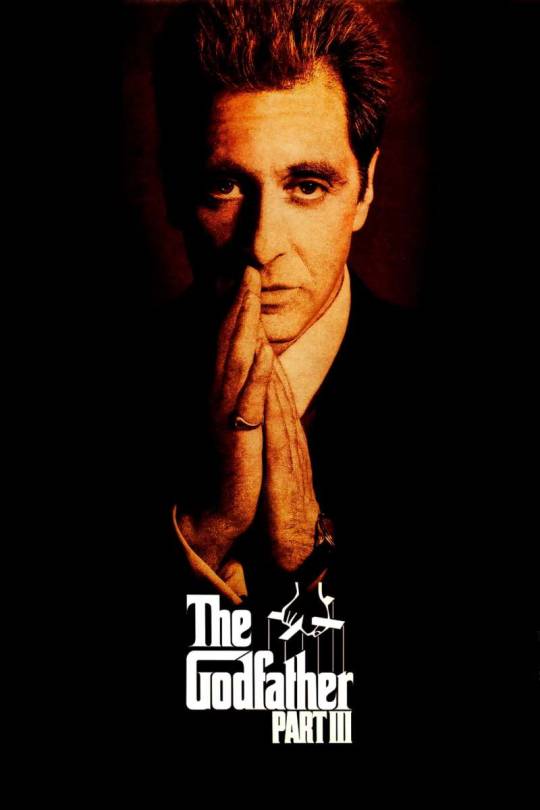
View On WordPress
#Al Pacino#Andy Garcia#Cinematic Masterpiece#Crime Drama#Epic Saga#Family Loyalty#Farid M. H. Sadeqi#Farid Sadeqi#Francis Ford Coppola#Gordon Willis#Hosein Tolisso#Italian-American Culture.#Legacy#Mafia#Mario Puzo#Mohammad Hosein Sadeqi#Power Struggle#Sofia Coppola#The Godfather Part III
1 note
·
View note
Text
Hurricane, Mima, Miami & Fanucci
Hurricane, Mima, Miami & Fanucci
I’ve now spent three days reading coverage of what my dad is breathlessly referring to as the “apocalyptic” situation on the west coast of Florida, following Hurricane Ian’s landing on Thursday. I live on the east coast of Florida and it might just as well’ve landed here and wrought the same havoc. Worst we would’ve seen since 1992.
I was a year old when Hurricane Andrew hit my childhood home…
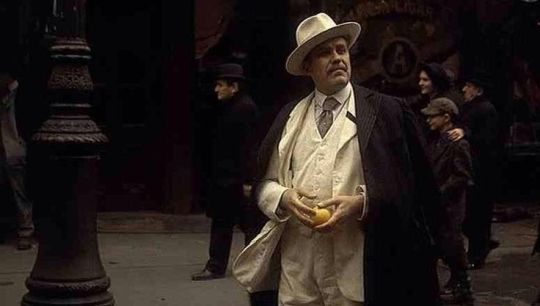
View On WordPress
#cnn#cuban revolution#diary#don fanucci#family#godfather#godfather 2#godfather II#hurricane andrew#hurricane ian#hurricane katrina#hurricane recovery#mario puzo#memory#miami#miami dade#miami hurricane#mima#new orleans#personal#trauma#tropical storm#wala#war#world war one#world war two
1 note
·
View note
Text



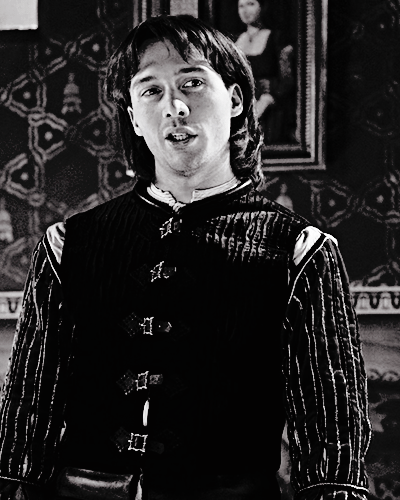

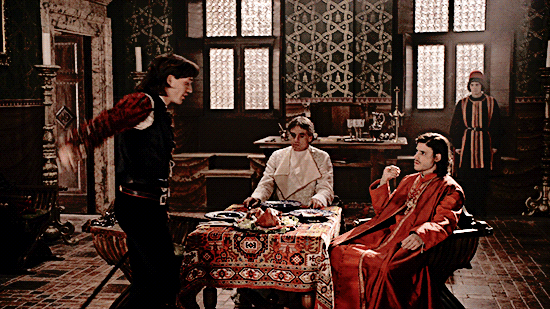
❝The Pope himself laughs at this, for his bantering sons are so clever and handsome and vital. Across the room the apprentices are giggling openly, and it is all suddenly a charming family scene. Cesare picks up his father’s cue, hugging Juan again and slapping him on the shoulder. “It is good to see you again, brother.” “You too. We have missed your sour face at court."❞
— Blood and Beauty: A Novel About the Borgias, Sarah Dunant.
#but when i say blood and beauty is the best book about the borgias???#like i'm obsessed with mario puzo's “the family” but also sarah dunant's “blood and beauty” is a gem <333#juan borgia#cesare borgia#rodrigo borgia#david oakes#francois arnaud#jeremy irons#perioddramaedit#userthing#theborgiasedit#the borgias#televisongifs#cinemapix#tvarchive#tuseraixa#davinciae#booksociety#smallscreensource#by jen
135 notes
·
View notes
Text
"Ah, you Mikey's little girl," Mrs. Corleone said. She had a heavy Italian accent, Kay could barely understand her. "You eat something?" Kay said no, meaning she didn't want anything to eat, but Mrs. Corleone turned furiously on Tom Hagen and berated him in Italian ending with, "You don't even give this poor girl coffee, you disgrazia." She took Kay by the hand, the old woman's hand surprisingly warm and alive, and led her into the kitchen. "You have coffee and eat something, then somebody drive you home. A nice girl like you, I don't want you to take the train." She made Kay sit down and bustled around the kitchen, tearing off her coat and hat and draping them over a chair. In a few seconds there was bread and cheese and salami on the table and coffee perking on the stove.
Kay said timidly, "I came to ask about Mike, I haven't heard from him. Mr. Hagen said nobody knows where he is, that he'll turn up in a little while."
Hagen spoke quickly, "That's all we can tell her now, Ma."
Mrs. Corleone gave him a look of withering contempt. "Now you gonna tell me what to do? My husband don't tell me what to do, God have mercy on him." She crossed herself.
The Godfather, by Mario Puzo
#page 236#the godfather#godfather#mario puzo#don corleone#corleone family#tom hagen#carmela corleone#mrs corleone#kay adams#vito corleone#italian american#mafia#mob#quote#quotes#literature#book#booklr#reading#i love mama corleone with every fiber of my being#she's a perfect woman#and has no flaws#i will not be taking feedback on this
38 notes
·
View notes
Text
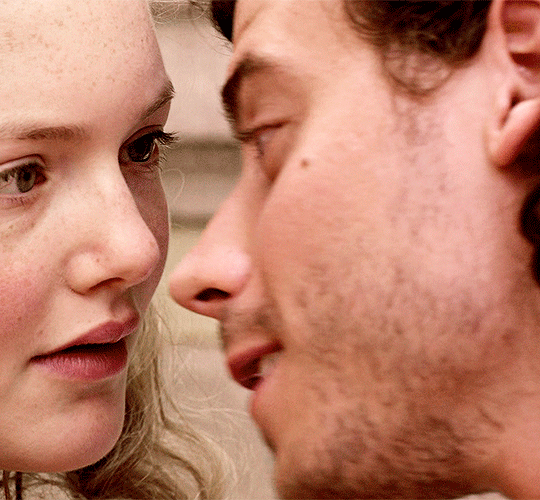
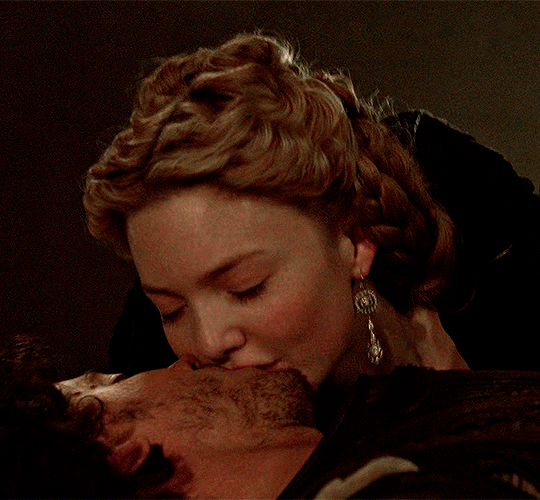
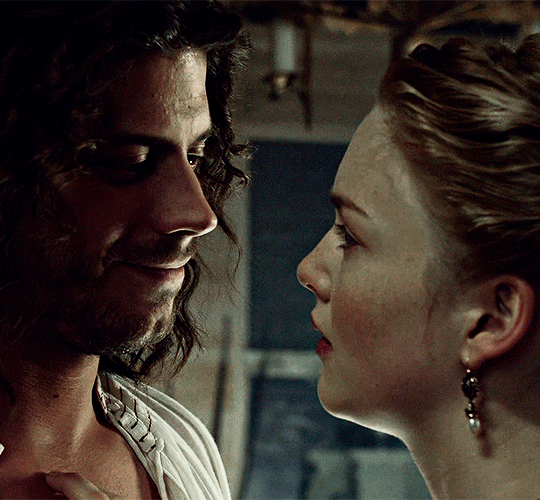

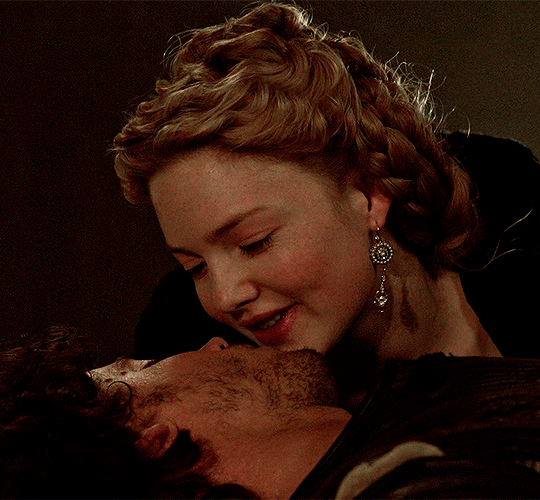
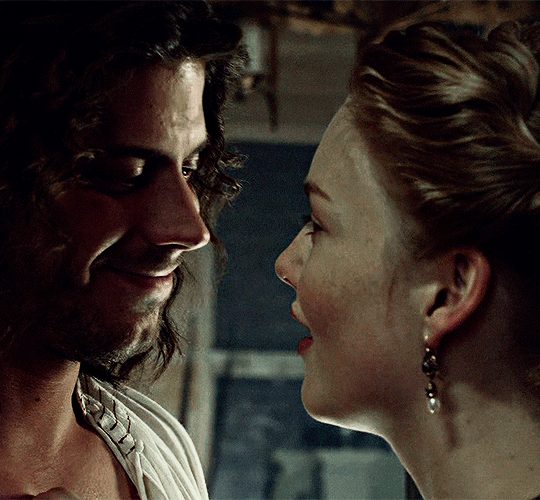
"Come," [Cesare] said, drawing [Lucrezia] close. "I need you now. For you are what is real in my life." - The Family, Mario Puzo
#tvedit#the borgias#cesare x lucrezia#perioddramaedit#cesare borgia#lucrezia borgia#zanisummers#userhann#usermyr#userhayf#tuserliza#userclayy#ours#by tha
876 notes
·
View notes
Text
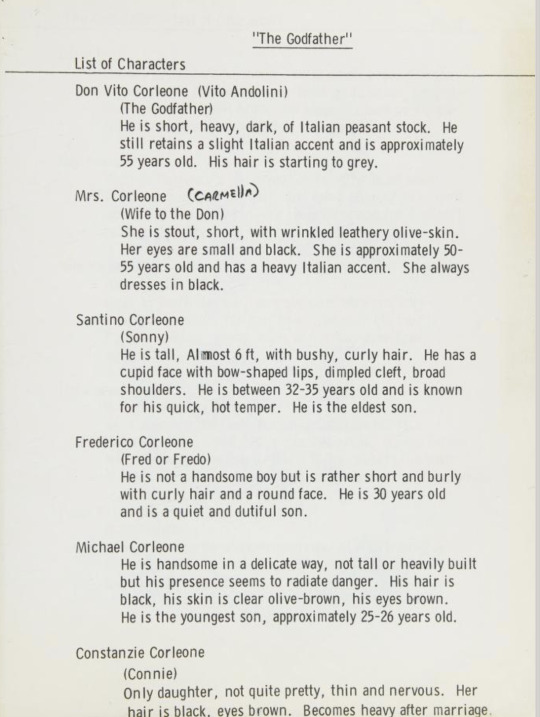
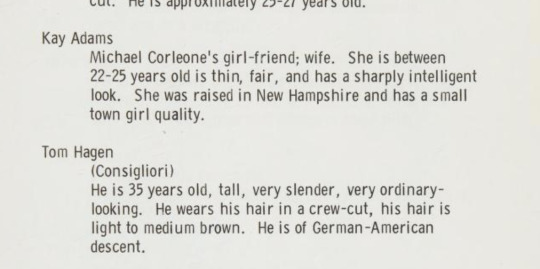



Francis Ford Coppola's Godfather character notes for the extended Corleone family, based on each character's description in Mario Puzo's original novel (from The Godfather Notebook, 2016)
#the godfather#francis ford coppola#al pacino#michael corleone#sonny corleone#fredo corleone#connie corleone#vito corleone#tom hagen#kay adams#apollonia vitelli
360 notes
·
View notes
Text
How to Write Political Intrigue (with book recs)
POLITICAL INTRIGUE! Intrigue in general! What is it?
For the purposes of this post (as well as how it's usually used in the writing/reading community), think: scheming. Plotting. Conspiracies in the shadows, bids for power and survival, secret plans, masterful illusions, all of that stuff.
It could be on any scale that you'd like, from a duel of wits (think Light's and L's game of cat and mouse in Death Note)
...to a large-scale plot involving entire countries and their people (like any espionage networks during any major wars, such as the American Revolutionary War to World War II, and so many more)
...or even medium-sized conflicts (families, like in The Godfather, or smaller national disturbances like the Watergate scandal).
Below are 4 core tips on how you can successfully write (political) intrigue plots:
1. Read + Research
Despite how hard it may sound, it's actually pretty easy to craft a realistic yet thrilling intrigue plot—with so many examples in real life and fiction, you can easily base your plot on an existing one and just change a few things like the characters, setting, and maybe a few plot points.
History and current events are always great places to look to, but here are some books that are chock-full of great politics + intrigue:
Leviathan (Thomas Hobbes): one of the most famous treatises of politics + human nature and their intersection. The book is an in-depth exploration of human nature, government, politics, and all of the root causes of why they exist. While it does take a specific philosophical angle (you might not agree with Hobbes' ideas), they are detailed explanations of how things work + why they are required from one perspective.
48 Laws of Power (Robert Greene): GREAT BOOK for helping you plan out the means by which you want the intrigue to happen. There are lots of simplified rules that tell you why people plan and scheme (e.g. "control the options; get others to play the cards you deal," or "pose as a friend, work as a spy"). There are LOTS of really great small stories of when a rule is applied in real life that are also general plot inspo!
The Godfather (Mario Puzo): very very good, intricate, and more emotional because it deals with the intrigue surrounding families
Joseph Fouché: Portrait of a Politician (Stefan Zweig) (biography): Fouché is absolutely insane. A genius at political intrigue. His life is literally one of the craziest stories of scheming, betrayals, survival, and a general vying for power, especially behind the scenes.
The Prince (Machiavelli): obviously, I can't leave out the original tips + tricks book with explanations of WHY intrigue matters as a means, especially in terms of protecting your power.
Trust Me, I'm Lying (Ryan Holladay): a large part of intrigue plots (you need to cover up the actual game you're playing) is the manipulation of information, creating illusions and spectacles for other people to believe. This book goes in-depth about media manipulation and information wars.
Empire of Pain (Patrick Raden Keefe): takes a rather different angle, through the personal/corporate manipulation of government, as well as how wealth dynasties (especially within families) are established. Remember the opioid crisis? This book explores the generational politics of money and power that led up to that.
Prince of Thorns (Mark Lawrence): Look! Fiction! Anyway, I'm biased because it's one of my favourite works of fiction of all time, but it explores political intrigue not only through an actor participating in it, but through the lens of the common folk. I.e., the consequences all that power play has on the populace due to a lack of actual good governance...
A Song of Ice and Fire (George R. R. Martin): I haven't personally read/watched anything GoT, but it's pretty much obligatory to put this series down in a post about political intrigue. It's famous for doing it well.
2. Plan. Like, meticulously
First of all, decide what scale you want your intrigue to be on: large-scale government/international affairs type, a corporation thing, something between two people, or even within a family? There are so many possibilities.
Intrigue plots are like mysteries; they must be tightly logical to be satisfying. One of the best ways of ensuring this is through analyzing each involved party—the actors.
Each actor has their own motivations, goals, and psychologies. After you establish what they want OUT of their intrigue, think about how they'd go about achieving it: a naturally hot-headed person might try to intimidate their way into getting what they want, or they might learn through the course of the story to cool down a bit.
A naturally imaginative and analytical person might come up with all sorts of scarily genius plans, and near-flawless execution. Of course, they would also react in different ways, depending on personality. Character consistency alone will make your plot seem that much more logical.
However, cracks in logic will happen because humans are inherently imperfect and not always rational. These cracks must be DELIBERATE and realistic and must seem planned out; they can't seem more like the author forgot a detail, or didn't know how to explain something (e.g. something happened and the writer never included the consequence of it because they forgot). It must be clear that it is a flaw on the character's part.
3. Never write intrigue for the sake of the intrigue
The incentive of all scheming comes down to mainly two things: gaining power and keeping it. Of course, you could choose to explore more unusual things, such as characters exercising intrigue to satisfy boredom... (think Light and Ryuk from Death Note).
But, the bids for power, security, and survival can be used to highlight things about human nature. Themes to explore include ambition, sacrifice, the pursuit of happiness, the corruption of character, the preservation of innocence in a cruel system, etc.
4. Explore through a narrow lens
Most intrigue plots are full of complex motivations, characters, goals, and the means they use to achieve said goals.
You should gradually let your intrigue plot unfold through the POV of a few characters, preferably one or two. An omniscient narrator for this type of story is INCREDIBLY difficult to pull off without confusing the reader.
However, more POVs work if you use all of them to focus on ONE or a few intrigue plots only—it can provide a multi-layered effect, exploring the same line of action and consequence through different perspectives. But, if everyone has their own intrigue plot, it's too easy to create a tangled mess where readers can barely delineate one plot from the next.
∘₊✧────── ☾☼☽ ──────✧₊∘
instagram: @ grace_should_write
Sorry for the massive hiatus—I have officially started college!! I've been pre-occupied with settling in, classes starting, a social life, extracurriculars etc. etc...life has been super busy, but great :)
I've started working on my books as well as poetry more recently, and I'm glad I'm getting into a new workflow/lifestyle. It certainly is different, but I'm starting to enjoy it.
Anyway, I'm surprised it took me this long to do a post about this topic, considering the fact that it's basically my writergram niche and my entire personality IRL, but I think it was mainly because I was trying to find a good angle to approach this massive topic. But, stay tuned for (probably) a part 2 because there's SO MUCH MORE to cover.
Hope this was helpful, and let me know if you have any questions by commenting, re-blogging, or DMing me on IG. Any and all engagement is appreciated :)
Happy writing, and have a great day!
- grace <3
#writers on tumblr#writing#booktok#writeblr#novel#writer#writerslife#wattpad#writing tips#writergram#wip#media analysis#book recommendations#bookstagram#plot holes#writing ideas#ya fantasy#fantasy#ya fiction#characters
202 notes
·
View notes